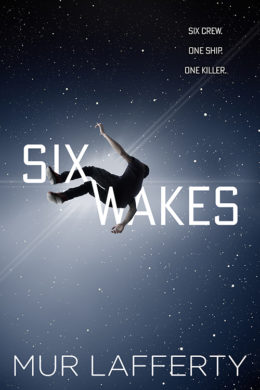Clones aboard a generational starship and murder combine in Mur Lafferty’s Six Wakes, a taut, engaging thriller that showcases the writer’s skill for plotting and character. Where this one is a bit different is that the victims are “reborn” soon after dying. In Lafferty’s imagined future, clones can regenerate upon death, making them ideal to oversee the flight of 2,000 inhabitants of the starship Dormire. There’s a lot to unpack in this relatively short novel, but Lafferty takes a great approach. When these clones are “reborn,” their memories don’t immediately join them, and the ship’s artificial intelligence is offline, which complicates the situation to a greater degree. Nobody knows what happened, and there’s a murderer in their midst. This is especially troubling because the novel begins with characters awakening in the middle of a very bloody crime scene.
Their deaths were the beginning of the novel.
Once they are reborn, our crew tries to piece together what happened. Of the six characters (Captain Katrina de la Cruz, security chief Wolfgang, engineer Paul, Dr. Joanna Glass, pilot Akihiro Sato, and cook/cleanup crew Maria Arena), Maria is the one who is at the center of the story. We see much of the action through her eyes; it is through her emotions we feel much of the plot. Lafferty doesn’t ignore the other characters, however. We get backstories for each crew member in a way that is reminiscent of Dan Simmons’ Hyperion, the structure of that novel itself an homage to Chaucer’s Canterbury Tales. There’s even a little bit of a feel of the movie Clue in that these characters’ pasts are slowly unfurled, revealing why each agreed to board the Dormire for multiple lifetimes. We learn that these six people weren’t model citizens before leaving Earth; their service aboard the Dormire will commute their prison sentences, allowing them to begin life as a blank slate, both on the ship and when they eventually arrive on the destination planet, Artemis.
One thing I appreciated a great deal about Six Wakes was the level of detail Lafferty didn’t include. Of course the novel contained some backstory details of why the ship was searching for Artemis, but the narrative was not burdened with extraneous information that wasn’t immediately pertinent to the murder mystery as it unfolded on the Dormire. Instead, Lafferty focused on the characters and the plot, including the history behind and ethical battles over cloning. The spaceship as set dressing allowed the mystery to unfold and the players to interact. By providing each clone with a detailed “origin story,” Lafferty makes that character the protagonist of his or her own story. So while Maria may be the primary perspective through which the reader experiences the story, each character shines in their own right.
There were only a few spots, for me, where the novel stalled slightly; some jarring transitions from scene to scene. But the fact that I read through the novel in just a couple of days speaks to how powerful a narrative Lafferty created in Six Wakes. Some humor is sprinkled throughout to balance the natural tension that arises from the combination of the murderer’s identity not being known while buried secrets rise to the surface.
In the end, Six Wakes is a very impressive novel. I found myself fully invested in the characters and carried along by the powerful pull of the plot as the tension ratcheted up towards the climax. There might be more stories to tell of these characters or the “world” they inhabit, but this was an excellent standalone SF thriller.
Recommended.
Six Wakes is available now from Orbit.
Rob Bedford lives in NJ with his wife and dog. He reviews books and moderates forums at SFFWorld, has a blog about stuff, and wrote for the sadly closed SF Signal as well as here at Tor.com. If you want to read random thoughts about books, TV, his dog, and beer you can follow him on Twitter: @RobHBedford.










